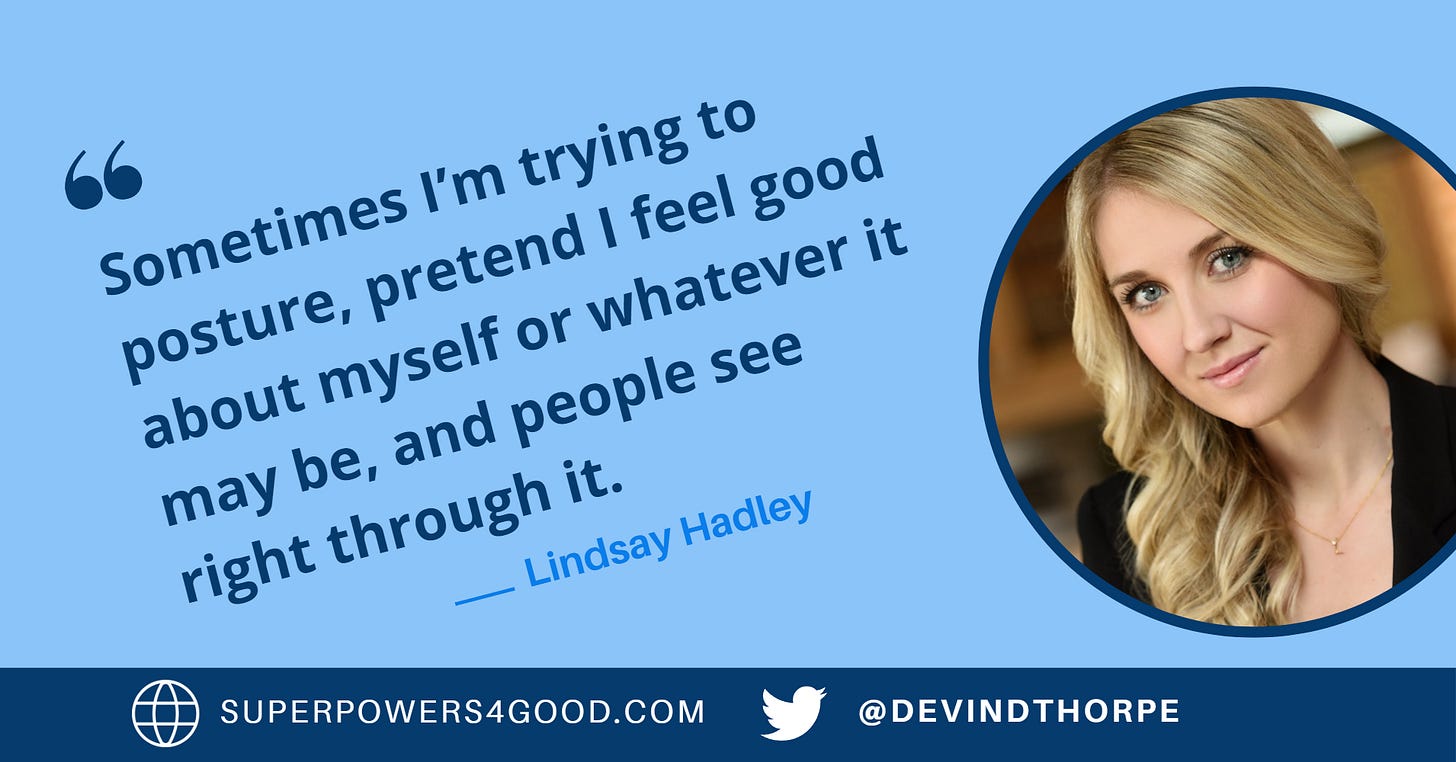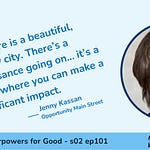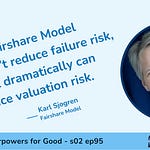Devin: What do you think of as your superpower?
Lindsay: One of my weaknesses is loving myself. What’s funny is my dear friend Henry Ammar says that our weaknesses are just our strengths with fear attached. So, when I think about my superpower, I believe that I have an incredible superpower and ability to love and especially love other people. I think that for years I’ve struggled with loving myself. But ultimately, what I’ve realized is I have a deep and profound love of self. It comes from my ability to see myself in others; I look so deeply for the best in people.
Lindsay Hadley has long been a player in the impact community. She’s becoming a player in movie and television production, preserving her focus on impact.
Uncharitable
Lindsay has just wrapped production of Uncharitable, a documentary film about Dan Pallotta’s TedTalk, book, work and mission to reframe how we think about charity. The film features the CEO of TEDx, saying that Dan’s talk is the most “paradigm-shifting” message in the history of the TEDx stages.
The film, directed by Stephen Gyllenhaal (Maggie and Jake’s dad), features Ed Norton and luminaries in the nonprofit sector.
Lindsay summarizes the message of the film:
The concept basically goes into the idea of how overhead is demonized currently in the nonprofit sector, that the general thinking or perspective or paradigm is that the smaller the overhead or the smaller percentage of overhead spent in a nonprofit means, the better the nonprofit is—the more worthy of your donor dollar. We basically showcase a very strong case for support that that is utterly false. That will utterly betray you if you're looking at a percentage of overhead to indicate impact.
Lindsay suggests an analogy to make her point. Image holding a bake sale where the ingredients, marketing and time are all donated. Sales reach $100. All $100 goes to the cause, say, helping the homeless. Zero goes to overhead. In an alternative scenario, an organizer puts on a big concert with profits going to the homeless. Revenues top $10 million, but it costs $5 million to put on the event, meaning 50 percent is overhead. Which do the homeless prefer?
She further argues that high-impact leaders should be well compensated. “If we can make somebody who makes a violent video game on the cover of Forbes for their financial success, why can’t we put the face of a woman who ends domestic violence on the cover of Forbes? I would love her to make absurd amounts of money because that’s a heartbreaking generational trauma that has all kinds of negative impact on our society.”
Made
Lindsay is now working on a television series. She’s partnered with the Harmon Brothers, who produce The Chosen, which has reached an audience of 300 million people. They finance the show via crowdfunding.
The Harmon Brothers have won a number of awards for their internet marketing campaigns for products like Poo-Pourri, Squatty Potty, Purple Mattress and others.
“They’ve taken five companies to unicorn status using their incredible gifting as storytellers and creatives and marketers; they’ve won countless Webby and Telly Awards,” Lindsay says. “They’re the best internet marketers in the world.”
Lindsay is working with them to fund the show using what the Harmon Brothers call their “torch campaigns.” These crowdfunding campaigns help fund pilots that help raise more money to produce high-quality television programming.
Lindsay recently spoke at SuperCrowd22 and is excited to use investment crowdfunding to capitalize production of her new show, Made.
Made will feature artisans who are the “literal masters of their craft, the Michael Jordans of their thing,” she says. “They make things with their hands forged in fire, stuff that is archaic.” Examples range from people who make samurai swords to hats.
Lindsay describes the concept of the show:
We really feel like people will fall in love with these artisans as we find out how they were made as human beings, as we learn about what they make. Then we're going to try to weave celebrities into episodes as apprentices who are genuine fans of that master craftsman’s art. and get them to bring their quote-unquote fame, their limelight onto these artisans who are literally like masters of their craft, just like maybe a celebrity is a master of their craft in film or music.
Watch for the new show!
In all her work, Lindsay uses her superpower, love of self, to enable her empathy and love for others.
How to Develop Love of Self As a Superpower
Lindsay didn’t always see her love of self—certainly not as a superpower—but over a seven-year journey beginning with a particularly dark chapter in her life, she’s discovered and built upon it to serve others.
“Sometimes I’m trying to posture, pretend I feel good about myself or whatever it may be, and people see right through it,” she admits.
She notes that a friend told her that weakness is just a superpower with fear attached. “I think that love is the point. To see the best in someone is the embodiment of love. I think that’s one of my superpowers. I hope to learn to love myself more, more freely, better, more sincerely, and more unadulterated with those insecurities that come with fear of that superpower.”
“About seven years ago, I had kind of this year from hell where a lot of difficulties, heartaches, challenges, whatever came into my life—and stressors,” Lindsay says. “I think it was like a death by a thousand cuts where I had a lot of hard things back to back to back to back. I had situational anxiety, and that led to situational depression.”
One of her mentors shared something profound with her. “External validation can become like an addiction, just like anything, just like pornography or alcohol or sex or any other substance food. It can actually be an addiction to get those hits of external validation.”
Lindsay acknowledges that her work ethic, network and good fortune have provided lots of opportunities for external validation.
She was meeting with her mentor in Africa during an extended visit. The context of the conversation was helpful. There, seeing hardworking people who couldn’t possibly work their way into her level of success provided a perspective that enabled personal progress.
She learned two fundamental principles there and then. First is the importance of gratitude—“radical gratitude.” She saw the need to not only value and appreciate the obviously good things in life but also the benefits of the trials, challenges and problems she experienced.
Second, she saw the need to surrender. “All religions try to get us to this place of now, surrender, peace, acceptance and love, a state of love,” she says.
She finds part of surrender in forgiveness. Lindsay shared:
Oprah Winfrey—I just listened to her—she's such a baller. She said something about forgiveness. She's been through a lot: sexual abuse and all kinds of difficulty in her childhood. She talked about forgiveness as really just accepting what happened and not trying to control for a different outcome of what happened in the past. It happened. Acceptance, right? So, this happened; I can't change anything about it. What are the gifts and the fruits of it now? Who am I becoming because of it? And loving the journey and just this surrender.
By following Lindsay’s example and advice, you can make love of self a superpower that strengthens your empathy and love of others, enabling you to do more good in the world.
















Share this post